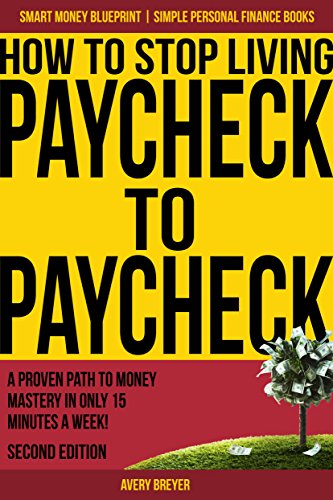Every day I listen to podcasts on real estate, finances, etc. While listening to one from BiggerPockets.com, the book “How to Stop Living Paycheck to Paycheck” came up in one of the interviews. I’ve heard the title mentioned a...
 Every day I listen to podcasts on real estate, finances, etc. While listening to one from BiggerPockets.com, the book “How to Stop Living Paycheck to Paycheck” came up in one of the interviews. I’ve heard the title mentioned a few times and decided to check it out. It’s a short read but dense as heck. The book is packed with the full spectrum of emotions all the way to complete and practical advice. The author also gives away a free worksheet where they promise it will get you going in the right direction with results to prove it IF you stay the course. After finishing the book, I have to agree. Let’s talk about it, shall we?
Every day I listen to podcasts on real estate, finances, etc. While listening to one from BiggerPockets.com, the book “How to Stop Living Paycheck to Paycheck” came up in one of the interviews. I’ve heard the title mentioned a few times and decided to check it out. It’s a short read but dense as heck. The book is packed with the full spectrum of emotions all the way to complete and practical advice. The author also gives away a free worksheet where they promise it will get you going in the right direction with results to prove it IF you stay the course. After finishing the book, I have to agree. Let’s talk about it, shall we?
What is a Budget?
Ok… I’m not going to get all into this because everyone should know what a budget is. However, this author does! Avery does a good job covering both directions of “budgeting” and not giving more weight from one side to the other (glass half full/empty). The writer also discusses maximizing the money you already have vs. finding ways to cut spending which was interesting.
Take Control of Your Paycheck/Money
Avery discusses 6 of the most important things you can do to take control of your money. This section starts off with supporting quotes from famous people like:
Money won’t create success, the freedom to make it will. – Nelson Mandela
This part of the book goes into good detail without being too overwhelming. In short, there is no excuse and plenty of ways to take control. I should note that there is a lot of emphasis on establishing an emergency fund. The message is spot on with what I’ve read and heard others say suggesting to have a minimum of 6 months worth of savings.
The 5 Biggest Benefits of Having a Budget
Another quote mentioned here increased my curiosity with this chapter.
The budget is not just a collection of number, but an expression of our values and aspirations – Jacob Lew
This quote is very telling and makes all the sense in the world. If you really value your money and have personal aspirations, then having a budget and/or a plan detailed out is part of your expression of its importance to you. The author does a good job explaining these benefits that align perfectly well with the quote.
Budget Myths Explained
It was fun reading this section because the content was so “matter-of-fact”. The author removes the cloud surrounding budgets that were created by feelings and special circumstances. This is pretty raw and easy to digest. “Budgeting will help you get further with the money you have, so you don’t have to work as hard, or as long.” That statement makes complete sense to me. There are plenty more and I’m sure you will enjoy it as I did.
The Right Mindset for Success
Now we get to the hard stuff! I say that because writing a budget by itself isn’t that difficult. Having the right mindset, continually adjusting your thinking, and maintaining discipline is the hard part. Don’t worry though, in this part of the book you will get 10 Tips on how to pull this off. It pretty much covers all you need so you should be able to get moving.
The author does charge you to promise yourself to make at least one small step towards your goal daily. There is a lot of emphasis on small wins for good reason. Changing your thinking can be difficult if you add in routine, familiar feelings, and common actions. You will find several good ways to help with a growth mindset.
This growth mindset is based on the belif that your basic qualities are things you can cultivate through your efforts
Budget Traps
Speaking of routine, familiar feelings and common actions, the author does an excellent job explaining most budget traps and how to avoid them. There are 11 traps discussed and detailed quite well. What I like about this section is that it is consistent with the mindset for success in the previous chapter. Again, another quote was made that I absolutely love!
I have not failed. I’ve just found 10,000 ways that won’t work. – Thomas A. Edison
Notice Thomas Edison didn’t even consider failure. To him failure was/is not an option and now knows 10,000 ways to avoid while continuing to make progress. Avery plays heavily on this and does a fantastic job making it plain in the 11 contexts given.
Practical Application
The author offers up an excel spreadsheet that will assist you in this entire process. It is one that has been tried and true if the reader is willing to dedicate 12 months to the process. You will find out where you stand, figure out where you want to be, and know how to get there. It’s pretty fascinating!
Another great thing about this book is that the writer gives some guidance for the first few months to help get over some common frustrations. There are very practical directions and alternative ways of thinking to help you along. Not only is the information detailed, but also serves as a good base to stand on when it comes to managing your finances.
Conclusion
I left out quite a bit of the information this book offers. The reason is due to the density of the knowledge and context around it. I suggest to read it for yourself and recommend it to anyone who needs direction on how to stop living paycheck to paycheck. Kudos to the author.















